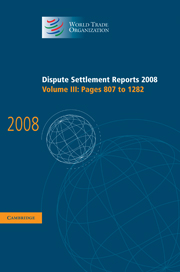Report of the Appellate Body
from United States – Subsidies on Upland Cotton – Recourse by Brazil to Article 21.5 of the Understanding on Rules and Procedures Governing the Settlement of Disputes (WT/DS267)
Published online by Cambridge University Press: 12 December 2017
Summary
INTRODUCTION
1. The United States and Brazil each appeals certain issues of law and legal interpretations developed in the Panel Report, United States – Subsidies on Upland Cotton – Recourse to Article 21.5 of the DSU by Brazil (the “Panel Report”). The Panel was established to consider a complaint by Brazil concerning the consistency with the Agreement on Agriculture and the Agreement on Subsidies and Countervailing Measures (the “SCM Agreement”) of measures taken by the United States to comply with the recommendations and rulings of the Dispute Settlement Body (the “DSB”) in the original proceedings in US – Upland Cotton.
2. In the original proceedings, Brazil challenged various United States measures that Brazil alleged constituted actionable subsidies within the meaning of Part III of the SCM Agreement, prohibited subsidies within the meaning of Part II of the SCM Agreement, export subsidies within the scope of the Agreement on Agriculture, and/or subsidies actionable under Article XVI of the General Agreement on Tariffs and Trade 1994 (the “GATT 1994”). Brazil also challenged certain of these measures under Article III:4 of the GATT 1994. The United States argued that, by virtue of paragraphs (a) and (b) of Article 13 of the Agreement on Agriculture, some of the measures were domestic support measures that were exempt from being challenged under the SCM Agreement and the GATT 1994.
- Type
- Chapter
- Information
- Dispute Settlement Reports 2008 , pp. 809 - 996Publisher: Cambridge University PressPrint publication year: 2010

